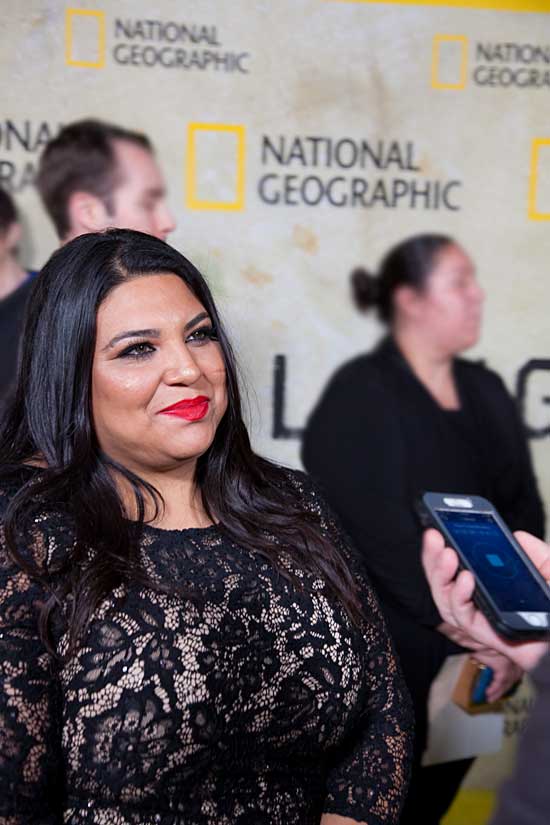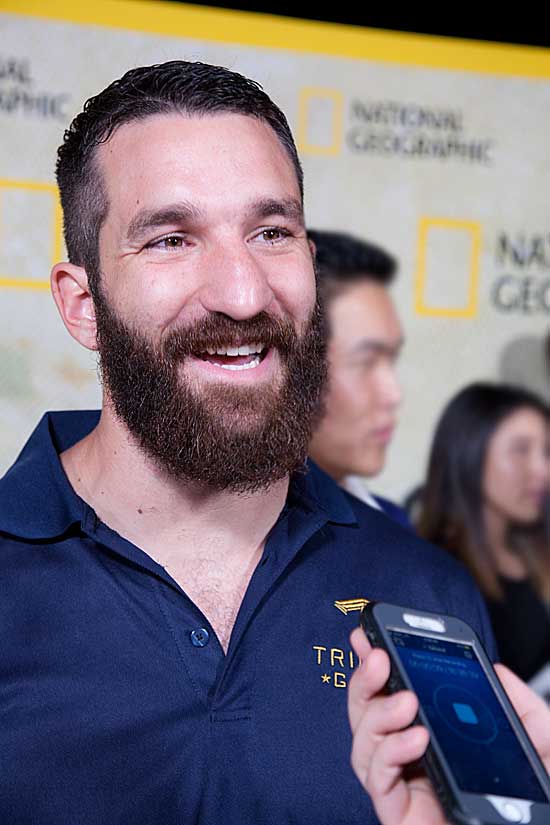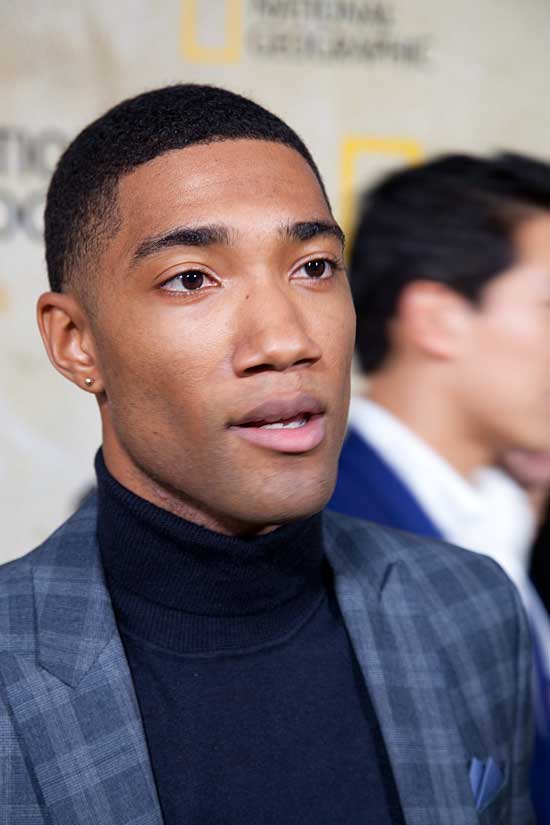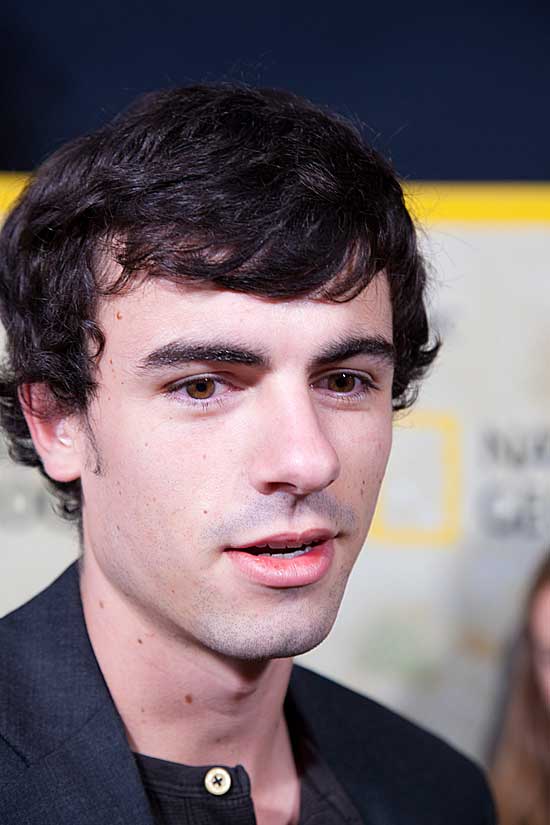 Photos by fashion photographer Gerald Pierre.
Photos by fashion photographer Gerald Pierre.
It’s not every day you get to interview 1) the actor who plays a real life soldier in a true war story; and 2) the actual soldier himself, standing side-by-side with the actor who plays him. Yet this happened to me a week ago at the premiere for one of the finest war movies ever made: National Geographic Channel’s The Long Road Home, which is a new mini-series that will air its first episode this week, Tuesday, Nov. 7, 9/8 Central. It tells the true story of a platoon of American soldiers who get caught in an ambush on April 4, 2004–known as “Black Sunday”–in Sadr City, Iraq.
The production stars E. J. Bonilla, Franklin Silvero, Kate Bosworth, Sarah Wayne Callies, Michael Kelly and many other superb actors. Christian moviegoers will recognize Kate Bosworth from her recent starring role in the deeply moving film 90 Minutes in Heaven (in which she starred with Hayden Christensen in an adaptation of Don Piper’s gripping true story).

Actor Kate Bosworth and Writer Kevin Ott at ‘The Long Road Home’ Premiere at Royce Hall, UCLA, for NatGeo (Photo Credit: Gerald Pierre, 2017)
And I must say: Christians will enjoy this film (assuming you can handle graphic war violence and occasional harsh language) because of its depiction of faith among soldiers. We hear some of the most beautiful prayers prayed by soldiers as a part of their daily routines–prayers that nourish their spirits before they set out to do their jobs. It portrays faith in a very respectful and edifying way–certainly one of the most inspiring, moving depictions of faith in combat I’ve seen.
And it was an unforgettable series of interviews–certainly some of the most emotional, powerful moments I’ve experienced at any movie-related press event. “The Long Road Home” changed the lives of people who were involved in it, and I could see it in the eyes of the actors, soldiers and Gold Star families who walked the yellow carpet that cool early November evening outside of Royce Hall in Los Angeles. (NatGeo always uses a yellow, not red, carpet to match their logo.)
To be clear, when I write “one of the finest war productions ever filmed,” I am not being insincere or overdramatic. “The Long Road Home,” based on the stunning book of the same name, the true story told by the highly respected ABC News Chief Global Affairs Correspondent Martha Raddatz, has some incredible backing and war movie pedigree. For example, besides NatGeo’s support, the executive producer, Mike Medavoy, a living legend in Hollywood with 325 films under his belt, has produced some of the most acclaimed war films ever made: “Platoon,” “Apocalypse Now,” “Thin Red Line,” and others. The mini-series also has one of the biggest urban war zone sets ever built, which you will learn more about in my discussion with the production designer. (They essentially built a small city. It is mind-boggling.)
I had a chance to speak with Martha Raddatz at the premier:
How do you feel tonight?
I feel emotional. How’s that. [laughs]
That’s a good response. [laughs] A lot of layers there.
I look around and we’ve got these two guys [points at actor John Beavers and real life soldier Sgt. Eric Bourquin who are standing side-by-side nearby doing interviews], we got a guy who was in a battle and a guy who’s playing him, and they have become best buddies. They’ve grown together not just as an army family, but a “Long Road Home” family who genuinely, genuinely respect one another. Everybody says “surreal,” right? It is, it is. I think the one thing that everybody has to remember: this is a true story. It really happened to Eric. It really happened to Aaron Fowler. [An army veteran also present at the premier.] It really happened to the Chen family. And that’s the message of all of this.
What do you hope it will be speak to our culture?
I think the one thing about this story to me, sometimes you watch war movies and they’re just helmets and camy and all that, but this is so distinct. You know the people. They’re not just super action heroes: they’re all different, they all come from different backgrounds, they all have different stories, they all found themselves in this alley together and these rescues squads that went in to get them from the alley, and it is a story of brotherhood and it is a story of sisterhood. We go back to the families [in the film], which was a turning point for me when a soldier said, “You think it’s bad for us, you should see what happened to our families.”
***
Before I share my interviews with the cast of the film, it’s only appropriate that we hear what the actual soldiers and family members who were involved in the events depicted in the film have to say. It was certainly a life-changing experience for them to be a part of a movie production that told their stories, and it was a life-changing experience for me to meet them, to see the profound co-existence of pride and grief in their eyes–pride for their loved ones and heroes who laid everything on the line, grief for the indescribable loss and sacrifice that was made by soldiers and families alike.
How ‘The Long Road Home’ Inspired the Soldiers and Family Depicted On-Screen
Aaron Fowler (production consultant, US Army Veteran and soldier involved in the April 4, 2004 event depicted in the film):
“The production has been so amazing to see the actors invite the family members and the soldiers and had a BBQ and sit down and share food with them and have the Gold Star family members come and see the actor playing the loved one that they had lost, and see them bond. It’s a very extreme experience that I don’t think most people in Hollywood, military, or anybody gets. So I’m thankful for it.”
Virgil Chen (currently on active duty and brother of Sgt. Eddie Chen, the first soldier to die during the April 4, 2004 conflict in Iraq), played by Kenny Leu:
How do you feel tonight, is it pretty surreal being here?
“It’s overwhelming. It is a pure honor to be here. Just because I see all of my brother in this film. Also, it’s honor for me to be here to meet all those people who were with my brother, so close as battle buddies.”
I imagine it’s something you’ll remember for the rest of your life.
“It is, a once in a life-time experience, and also for me, it’s closure. For me to know what really happened to all these fine soldiers on that day.”
Sgt. Eric Bourquin (US Army Veteran and soldier involved in the April 4, 2004 event depicted in the film), played by Jon Beavers (pictured with him below):
“I’m here with great people who support me and I’ve had some of the Gold Star family members tell me thank you, which is the craziest thing in the world. But the fact that they’re happy was all I need. That makes everything worth it because that’s what this is about, it’s about family, and people being able to understand it.”
Jon Beavers (“NCIS,” “Gotham”), who plays Sgt. Eric Bourquin, said this about how the film inspired him:
“I can tell you, I have been surrounded by support. I’m an actor, I’m Jon Beavers, I’m playing Eric. Not only did Eric support me but all the guys from 2-5 Cav, all the Lancers that lived this. And the family members who lost loved ones on that day. They’ve supported us from the very beginning, told us that we could do it before we even believed we could do it ourselves. And I felt an incredible responsibility from the beginning to tell this story as truly and as honestly as we possibly could. And we have had a support system around us that has been unbelievable and it transcended just doing a job or being in a movie or whatever. It became a family affair, to tell a family story, and it’s been beyond inspiring. I’m changed forever.”
Gold Star family member Lupita Garza, wife of Israel Garza who was killed on Black Sunday and who is portrayed in the film:
How do you feel tonight?
“I’m nervous. Very nervous. But excited. I love seeing the crew because they’re just so humble, everybody’s been so nice throughout this whole experience.”
Have you had a chance to see the movie?
“Yes, actually I saw it Friday in Fort Hood. There were definitely parts where I had to close my eyes. It’s hard to relive it.”
I think it’s brave you’re out here doing this.
“Thank you very much.”
What’s been one of the most meaningful things for you throughout this whole journey?
“I feel very blessed. A lot of soldiers they die and their story kind of dies with them. With this my husband’s story will live on forever, and it’s such a blessing for my boys too, they know that their dad’s death wasn’t in vain but had a purpose.”

Lupita Garza, Gold Star family member (Photo credit: Gerald Pierre) Copyright Gerald Pierre and Rocking God’s House 2017
Another veteran at the premier said this about the film:
“I think they [NatGeo] love getting the actual person behind the mask. They’re not just killing machines going out there. They’re gonna tell the real story, the story of these fathers and these sons that went out there and maybe not the robotic terminators you see portrayed in the movies. I’m really excited to see that.”

Military veteran at ‘The Long Road Home’ premiere (Photo credit: Gerald Pierre) Copyright Gerald Pierre and Rocking God’s House 2017
How ‘The Long Road Home’ Inspired the Actors and Filmmakers
As I mentioned earlier, this mini-series has some serious war film pedigree behind it. For example, Mike Medavoy, the executive producer, has made hundreds of films, including a few you might have heard of: “Apocalypse Now,” “Platoon,” “Coming Home,” “Rocky,” “One Flew Over The Cuckoo’s Nest,” “Annie Hall,” “Raging Bull,” “Amadeus,” “Dances With Wolves,” “The Silence of the Lambs,” “Terminator 1 and 2,” “Sleepless in Seattle,” “Hook,” “Legends of the Fall,” “The Thin Red Line,” “Shutter Island,” “Black Swan,” and “The 33”–just to name a handful.
While I spoke with him, he seemed enormously pleased with “The Long Road Home,” which speaks volumes (coming from him):
How do you feel tonight?
“I feel relieved because we have ten more days to go before the film airs, but I’m really really happy about it. It’s a great tribute to not only to those people who go off to war and to combat, but it’s a tribute to the families who have to endure the pain. You never know whether their husbands are coming back. And I feel a sense of accomplishment. This is my fifth war movie. “Apocalypse Now,” “Coming Home,” “Platoon,” “The Thin Red Line,” and this one. And I feel that each time it puts a mark on what I’ve done, you know, it’s the 325th movie that I’ve done. I’m happy to have done it.”
What do you hope this production will speak into our culture?
“It is about the nature of man and humanity. And that’s what’s really important. I did a film about the Chilean miners, I don’t know if you saw it or not, it’s called “The 33.” It won all kinds of awards, it’s an interesting film. To me that’s what’s important. I’m looking for human contact. How do you feel when you leave the theater.”
***
The mini-series also has a superb ensemble cast with a refreshing mix of established Hollywood stars and talented newcomers and a team of some of the best filmmakers in Hollywood. During my interviews with the cast and crew, I asked many of them what inspired them the most while working on “The Long Road Home”:
Sarah Wayne Callies (“The Walking Dead,” “Prison Break”), who plays LeAnn Volesky:
“I think when it comes to the most inspiring thing it has to do with the devotion that people in this story choose to have for another at a time that is the most personally challenging in their life. It’s one thing to reach out to people when you’re feeling strong, it’s another one to say, ‘I am at my weakest, and I will still protect you.’ That’s brave.”
When you’re at your rock-bottom but you still give when you have nothing to give.
“Yeah! You dig deep. You dig deep.”
Carter Redwood (“Yellow Bird”), who plays Medic Pedro Guzman:
“I think really just because I had the opportunity who’s still alive, and it gave an added level of responsibility. So in terms of working with him and get his first-hand account, I was able to really dive into the character and bring it to the project. Not only was it a true cast bonding experience this project stands alone than anything else I’ve done because I got to actually meet the person I was playing, talk to him, ask stories, this was definitely that was really special.”
Darius Homayoun (“After the Dark”), who plays interpreter Jassim al-Lani:
“Playing a real person. This was my first opportunity to do that and not only just myself but to be around other actors who are playing their real-life counterparts that they spend time with now and while we were shooting and the weight of that, the opportunity of that means a lot more than most jobs we get to do and because of that it’s incredibly satisfying. It means so much more.”
Multiple layers of meaning.
Exactly, and you’re responsible to tell the real stories of real people who have real families who you’re meeting. The person that I hope thinks I did it right the most is the man that I’m playing whom I’ve still yet to meet.
That must be a little surreal.
Yeah, it’s a very odd feeling.
Mikko Alanne, screenwriter (“The 33”), executive producer, show runner:
“I first started on this project nine years ago when Mike Medavoy first sent me the book, and I just fell in love with the book, fell in love with the soldiers, the families, in one sitting. I had never met any of them but I just felt like for the first time I understood something profound about what our soldiers and families really go through, what it’s really like to go to war for the first time, and it’s something that we’ve never seen before. I think too many Hollywood films are about elite soldiers on missions where you never get to know anything about the soldiers. I joke that in a lot of productions the only thing soldiers do besides combat is work out, and that is not our story. Even though it is a war story, even though it’s about a very significant day in the Iraq war, it is above all things a character study. And it’s I hope it’s the most intimate and authentic portrait of what life is really like for our military families.”
Roby Attal, who plays Cpt. David Mathis:
“This is my first very large budget project than I’ve been a part of. First it was captivating just being on set, then on top of that thinking about the actual story. It’s not entirely fiction, I mean it’s got fictional elements, but being on set with actual vets was really moving to see.”
That must’ve brought it home for your pretty quick.
Yeah! Almost terrifyingly so. You almost feel guilty for what you’re doing. Man it was a really cool set. It was really cool being around a lot of extras that were actually members of the military there on assignment. So it was really cool being around all that.
Jeff Beal, Film Composer (“House of Cards,” “Appaloosa,” “Blackfish,” “Ugly Betty,” “Monk”):
What were the interesting things to you about the score for “The Long Road Home”–the things you enjoyed about writing the music for this project?
“You can decide what the music’s gonna describe in a show, sometimes it’s about the place, but one of the things we decided early on, we’re in Iraq, we see Iraq, so we didn’t want it to sound Iraqi. The story is really about the soldiers and their emotional lives. So there’s really two things at work: one is that it’s a very realistic take on how intense combat can be, so there’s some very visceral, tribal elements, there’s some electronics. Really the heart of the score is much more traditional. Very thematic materials, string orchestra piano, trumpet and french horn, very melodic at times, and heroic too. As horrible as these situations are what really makes it fascinating is these little acts of bravery and sacrifice and courage between these characters.”
Roland Buck III (“Chicago Med”), who plays Spc. Rafael Martin:
“I have a newfound respect for a soldier, what they give up, for us, for people that don’t necessarily–some people don’t care, some people that don’t respect the feelings that we have to do what we’re doing right now. And it takes a toll not just on them but their families as well, on their communities, back here in the States. So it’s a heavy job, and it takes a special person to do that, so I respect that.”
What was one of the most challenging things about doing your role?
So there’s night shoots, right? That I didn’t know could last a month. We had like a month of night shoots from 6am to 6pm, and we’re in this battle, so I’m reliving it every day, explosions every where. But the great part about that is now as an actor I can just react instead of act, and that’s what you always want to strive for is to react so it makes it believable as possible. But yeah it took a toll mentally and physically but you leave it all out there for the greater good, and I think it turned out well.
May Calamawy, who plays Faiza:
What was the most inspiring thing for you working on this project?
This is the first job I ever had in acting. That’s probably one of the most exciting things, and I feel super spoiled because we were an amazing family within the cast, and we’ve all had such different roles, and my role was in an [Iraqi] family, which might be perceived as the enemy if you look at it in some certain way, but from both perspectives we [the American soldiers and Iraqi family] feel like toward the end we all just want the same thing, so just understanding and being empathetic to what they [the Iraqis] were feeling, and feeling like NatGeo is portraying that in a way that’s genuine. That’s inspiring to me.
Katherine Willis (“Queen of the South,” “Friday Night Lights,” “Deliverance Creek”), who plays Cathy Smith:
“I think everyone you’ve talked to has probably said this is life-changing, career-changing. It’s been like that for me. I think the most interesting thing for me is developing a friendship with the woman that I play. She’s very much still alive, and we’ve talked a lot, we’ve communicated a lot. I feel like she’s a part of my family, and I feel like what her son experience and as a parent what she experienced is profound. So to have the opportunity to be part of this story is truly the honor of my career.”
The way you put it is interesting, you’re really becoming a part of someone’s life story, not just a screen story.
“Yeah! We had a screening on Friday in Fort Hood and we both watched it for the first time sitting beside each other, so no pressure. [laughs] If there was ever a time that I wanted to get it right, I so wanted to get it right. And she was really happy.”
Seth Reed, Production Designer (“Shut Eye,” “Super Girl”) Art Director, Art Dept (“Minority Report,” “Fight Club,” “Real Steel,” “Valkyrie,” “Tombstone”):
This project seems like a huge undertaking. Is it the hardest or largest job you’ve ever done?
“Yes, the largest job I’ve ever done. Hard too, but I’ve had some fantastic help, so it was big in scale but I had a lot of people helping me.”
What were some of the highlights for you?
“The highlights were it was an incredible research project. We had to learn and be accurate and get a lot of help in terms of translation and learning about the culture, and then we built, built like crazy, we build like you’ve never seen anybody build before, and we had not a lot of time. We ended up building about 85 buildings but altogether 115 buildings were changed or transformed, and we built over half a mile of streets, two and three-story tall buildings double-sided. You’ll see it because you’ll see guys shooting from roof tops and balconies and everything. And that’s only the streets and exterior sets. We built a lot of the interiors and a lot of the other stuff too. So it was a very large project.”
Sounds like you have a stressful job. How do you cope with stress?
“I cope with stress by having friends and having dinner and enjoying ourselves and relaxing on downtime. I like to ride, like road bike ride and spin, I like to spin, so I do whatever I can to just let it go when I can. Jobs like these you never let go, of course. You just keep going, and you keep going. But I had to just trust because I had this really fantastic crew with me and some of them are here.”
Brayden Scott (“Lone Star Deception,” “Social Animals”), who plays Alex Volesky:
[There were some fun moments during the interviews, and it’s often the child actors who have the most sense of humor.]
What’s been the most interesting thing about being on the yellow carpet tonight?
“What’s been interesting is why am I taking so many photos! Like 200!”
Ian Quinlan (“Gotham,” “City Hall,” “Music of the Heart”):
What was the most inspiring thing for you working on this project?
“One of the more inspiring things was getting to know the life of a soldier, getting to know these men and women and what they do and why they signed up. Every one of them has a different story but a lot of it ultimately comes from a sense of duty and a sense of loyalty to country and loyalty to family and to freedoms that we benefit from here. But they forego those freedoms so that we can benefit from them. I wanted to honor these men and tell that story about their sacrifice and their tremendous courage.
“Also, I was blown away by just the sense of what war costs, and who pays it. And what that means, and training was something that blew me away. You get a lot of strategies for how to prepare in a difficult situation and how to work together and the men and women in that unit are always working for the person to their left and to their right, to their utmost. But there’s no 100 percent guarantee that says do this and it’s all gonna be fine. So when you learn what that is, and you learn that they still do what they do in order that we can benefit? That’s tremendous. Martha Raddatz says it all the time. They’re not just soldiers, they’re our soldiers. They do this for us.”
It’s incredible and counter-cultural. Our culture’s very me-centered.
“Exactly! A lot of these guys, specifically with this platoon, it was September 11th was what made them sign up, and some of them signed up on September 12th. I’m a native New Yorker in New York, and I don’t know a lot of people who even thought about doing that and it happened in our state. So that blew me away too.”
Jorge Diaz (“The 33,” “Paranormal Activity: The Marked Ones,” “Arrested Development”):
“Coming into this project I had like a profound respect for the military. I didn’t come from a military background. My family wasn’t in the military, I had a cousin in the Marines, but that was pretty much it. And I had sort of an image of what a soldier might be or what a military family looks like or where they come from and their value system. But being able to connect to the families, not only involved in this story but living on Fort Hood for three and a half months, and living amongst them and connecting with them, laughing with them, eating with them, crying with them, hearing these stories, I connected with them on such a human level that I will forever carry that in my heart.
“And I hope that this is what the series does for audience: that it brings it down to a human level. Because there’s a diversity in why people are doing this, there’s a diversity in where these people come from, different countries, different background, all sorts of people are in the military. This is about one story, one little snippet that goes really in-depth and shows you the human face and the heart behind these images on news or other films, you know what I mean?”
Yeah, it brings it from the head to the heart.
“Absolutely! And I’m all about that as an artist when you get an opportunity to do that, I want to bring heart to whatever I do.”
Mike Davis, who played Cpt. Dylan Randazzo:
“Working with everyone on the set has been super inspiring but just giving some credence to the story of the military families. I think with a lot of these war stories you hear about the active duty soldiers you don’t hear about the family back at home, that issue specifically with the parents and the kids, I think that itself is very inspiring.”
What did you have to do to prepare?
“Just doing your homework and just being prepared as you can be, working with some of these higher echelon talent was also very inspiring in itself, so that in itself was my motivation to make sure that I came prepared and ready to work.”
Alex Ross (“Logan Lucky,” “Queen of the South”), who played Sgt. Jerry Swope:
“I think one of the most inspiring things was reading Martha’s book initially, and then getting asked to play Jerry, I guy who was a hero, who is a hero, and understanding what he went through in that ambush and just getting to chat with him and talk with him about it. It was inspiring. It’s a story about humans on every level and the sacrifices they make.”
Other Actors in the Film Industry React to ‘The Long Road Home’
“The Long Road Home” also attracted other stars from Hollywood, and many of them were invited to join everyone on the yellow carpet on their way in to see the film. I asked them their thoughts on “The Long Road Home” and what its theme and plot concept means to them.
Sammy Rotibi (“Django Unchained,” “Mars,” “Batman vs. Superman: Dawn of Justice”):
“I think it’s great that they talk about the men and women that put their lives on the line fighting for out freedom. You know, I don’t believe in war, but it happens. But I think we need to glorify and talk about the men and women who go out there and put their lives at risk for us to have the freedom to be here tonight. I think it’s a beautiful thing, it’s an amazing thing, and I like the fact that they’re telling stories about them and what they go through. So I’m really excited about this series.”
J. Lee, actor (“The Orville,” “Family Guy”), writer (“The Cleveland Show”):
“In a world where we have so much turmoil, and you hear about wars and rumors of wars, I’m interested in seeing another story about what happened in certain instances that really matter. I haven’t read the book but I heard about the story, and when I got invited to the screening, I was like, “I am going to see this.” I like to stay up on top of things like this, stories that aren’t always told right when things happen, [to see] what’s the truth, and a good balance of the whole picture, not just the amazing stories of the soldiers but also the families. It’s a long road home for the people who are not on the battlefield as well.”
Chandler Kinney (“Lethal Weapon,” “Girl Meets World”):
“I’m very excited to see it. I am kind of part of a military family, my granddad he fought in the Vietnam War, and so I’ve got a sense of what it’s like for family members to see someone go off and fight, and I know that’s very scary. I’m really excited to see it, and it’s an important story that needs to be told that people need to hear.”
You can join Chandler Kinney in her excitement and see the first episode of The Long Road Home yourself this Tues, Nov. 7, 9/8 Central on the National Geographic Channel.
A special thank you to Gerald Pierre for his wonderful photography at the premiere. “G,” as he is known, even managed to sneak into the famous NatGeo frame:

Gerald Pierre (Photo credit: National Geographic, 2017, after-party reception at ‘The Long Road Home’ premiere, Royce Hall, UCLA)
And here are other photographs that G took at the event:






